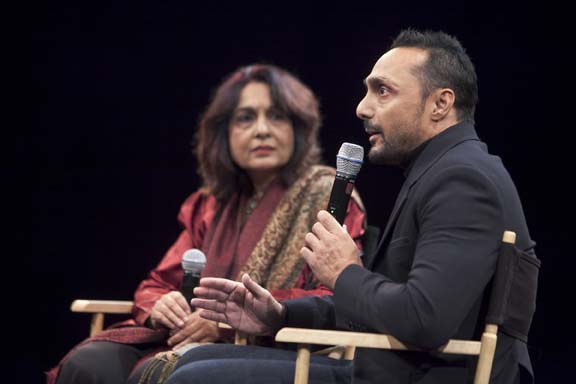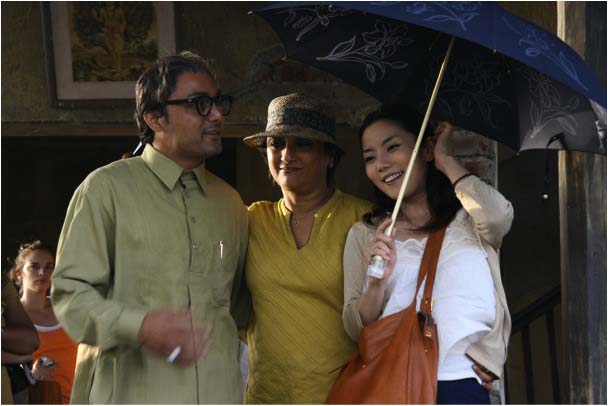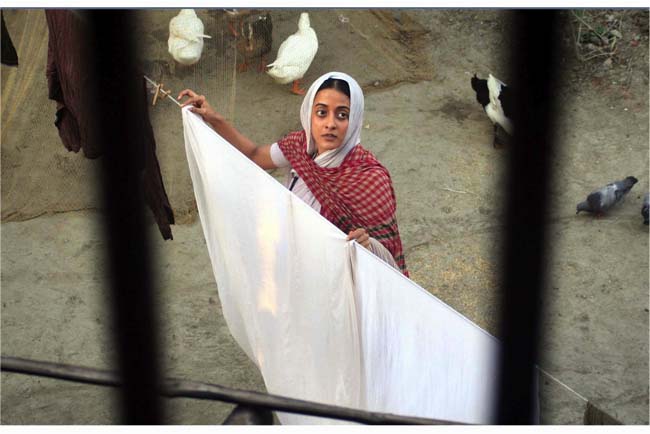
Rahul Bose in Aparna Sen’s ‘The Japanese Wife’
It’s a bitter-sweet love story you could hardly imagine in today’s frenetic world – a man and woman separated by oceans and countries yet married to each other, without having ever physically met. ‘The Japanese Wife’ is as spare as a Haiku, and as beautiful. Recently Rahul Bose was in town for the MIAAC festival premiere of this Aparna Sen movie, which is based on a short story by Kunal Basu. The film stars Rahul Bose, Raima Sen and Chigusa Takaku, and a stellar support cast headed by Moushami Chatterjee.
This atmospheric film, set in a village in Bengal, moves slowly, almost like the river which is so much a part of it, yet it fully draws you on with finely etched characters. The tale revolves around Snehamoy, a non-assuming schoolteacher in a village in the Sunderbans, who has a long distance love marriage with Miyage, a Japanese pen friend in Yokohama. The two never meet yet you feel the strength and the commitment of that love, and are touched by it. The story gets more complicated when Sandhya, a young widow comes to live in the home Snehamoy shares with an aunt.
Filmgoers saw Rahul Bose recently in Onir’s ‘I Am’ and can look forward to seeing him in Deepa Mehta’s ‘Midnight’s Children’ based on Salman Rushdie’s acclaimed novel. Says Rahul Bose, “It’s one of my top 3 novels of all times – and to be actually in it is surreal – it’s fantastic to be in it and Salman Rushdie has written the script.”

Rahul Bose, consummate actor that he is, absorbs and takes on the coloring of the characters he plays. In ‘The Japanese Wife’ this savvy urbanite becomes the quiet village schoolmaster right down to his Bengali accented English. He is Snehamoy and you believe in his love for Miyagi and the reality of the world Aparna Sen has woven.
In a Q and A after the screening with Minu Tharoor, English professor at New York University, Rahul Bose talked, often tongue in cheek, sometimes movingly about his passion for acting and cinema.
Rahul Bose on The Japanese Wife…
Q: What was it that attracted you about this script?
A: Well, what’s not to be attracted by it? It was just a wonderful piece of cinema and I can see what stemmed from a piece like this, and I think what she did with Kunal’s short story was heroic, it was wonderful. The only thing that was a stumbling block was I thought I was totally inappropriate to play this guy – so I was terrified. I didn’t discover this character till 24 hours before we shot the movie – normally it happens a little earlier but in this case I didn’t really get Snehamoy till 3 o’clock-ish the afternoon before shooting, when I was in the dhoti and kurta with specs and wig and I was cycling around the block in Calcutta where I was staying in Alipore and I knew I didn’t have him.
I think acting, especially in something as delicate as this, is like when you’re switching a radio knob to look for a correct frequency and you know the program you want to listen to is at 99.5 and you don’t get it. You try 4 and you try 6 and you still don’t get it and you feel that you’ve lost it forever, it doesn’t exist. And then suddenly at 99.48 something happens and you suddenly can hear very clearly the song you were looking for, the radio station you were looking for. It’s really a chance – you have to try hard but ultimately it’s a lot to do with chance and I think I got lucky. At least I hope so!”
Q: Whether it was luck or talent, I think everyone will agree you certainly got it. What you got was, of course, very apparent for us all to see in the very sustained performance through out the film. But is it possible for you to suggest in words what it was that you think you got and that you conveyed?
A: I think the greatest challenge to play Snehamoy was to be invisible. He’s the kind of person who, if the panwalla across the road was told that this boy had died, he would barely recollect who this person was although perhaps Snehamoy might have gone there every day to eat paan.
In cinema, to be invisible and yet to be charismatic enough to be the soul of the film, so to speak, I think you have to let the camera do what it has to do and you just have to dive really deep into the truth. As long as you’re true you don’t need to worry too much – at least I thought that let me do this part and forget about being charismatic – which in any case is a losing proposition when it comes to me!

Rahul Bose on working with Aparna Sen…
Q: This is the third film directed by Aparna Sen – Was this experience different from the other two?
Yes, it was because we fought a lot – you know familiarity breeds contempt. As we were shooting this movie we had huge disagreements and arguments and flaming rows – it was all very dramatic. On a boat in the middle of nowhere and 40 degrees centigrade! It was a very hard shoot – we stayed in places that were completely inhospitable, 400 insects in the room plopping all over your machar-dani and gradually becoming lower and lower as the night progressed.
It was very humid – in fact, they had a sign above the showers which said ‘Why Bother?’
I had my own internal problems – none of them psychological – I was preparing to play a rugby tournament for India two weeks after I finished the shoot so I had to keep training in that little room; wake up at four a.m, train till six and then start shooting.
I think you start a relationship with a director just like you are new lovers – you are very eager to agree with the other person’s point of view and say ‘Ah, I think the same way too and how alike we are – and how magical this relationship is going to be!’ Then you go to the next film whereby you go ‘You know we’ve had a wonderful honeymoon and we’re lovers and it’s wonderful’ but then you say, ‘Oh, my God, you do smell sometimes!’
And then you go to the third film and its like ‘Listen, for God’s sake, do not, do not come to my side of the bed’ – you get my point! You start getting very crabby and it was like that in film no. 3 and I’m quite sure she’ll never work with me again! But the communication becomes telepathic – a frown from her and your heart sinks and you know you just haven’t got it. You know exactly what she wants and you know exactly where you went wrong. So I think, in that respect, there was much more silence and much less discussion this time, but it was equally, if not more, dense.
Q: Talking about cultural affinities, the Bengali accent you adopted for the purpose of English in the film – how hard did you have to work on it and did you feel it was like a caricature and that it would in any way diminish the character?
Well, I still fear that – I still think in a few places Sneho is a bit of a caricature – I did three takes for every single line I did – one was over, one was what I thought bang on, and one was under. It normally takes an actor in a lead of a film about five days to dub a film – this one took me 29 days.
It was incredibly difficult to be a South Bombay boy who’s being rural Bengali and then speaking English in that way. It was phenomenally difficult – in fact she said I’m going to dub you. She dubbed me with Rudro’s voice. My heart broke – I said let me use Rudro’s dubbed track to give you my version of the dubbed track. Rudro was brilliant but there was no soul – he wasn’t Snehamoy.
I spent 29 days dubbing and I remember very clearly, 31st of December, she called me and said, it’s fantastic and I’m going to use it. And I said that’s the best New Year’s gift you could give me. But I had been perilously near to losing what I believe was half a performance.
Rahul Bose on the Craft of Acting…
Q: How do you compare your performances to ‘English August’?
A: I saw ‘English August’ a year ago and it still remains to my mind the best film in English that’s come out of India ever and for that Dev Bengal, the director needs to be congratulated.
You start your life wanting to be the best, and you want to be perfect and you strain really hard to being that and I was very fortunate to get films like ‘English August’ and ‘Split Wide Open’ early on in my career. Then midway through, you realize that maybe I should relax a bit and let things come to me a little more organically.
And then finally you come to a point where you say, ‘Now I’m going to mess with this, I’m not going to learn my lines any more for any of my movies – I’m going to actually say the words as if I’ll just struggle through, muddle through them – and directors hate me for this because I’m never on the page, I’m always changing things around. It gets very frazzling for them but it’s my way of now saying I’m OK, I know that I can.
I just now want to get to a point of greater truth, so it should not be too pat, it shouldn’t be perfect and it shouldn’t be pre-thought out. That’s where I am now. Today I’m in the disrespect phase of my career.
